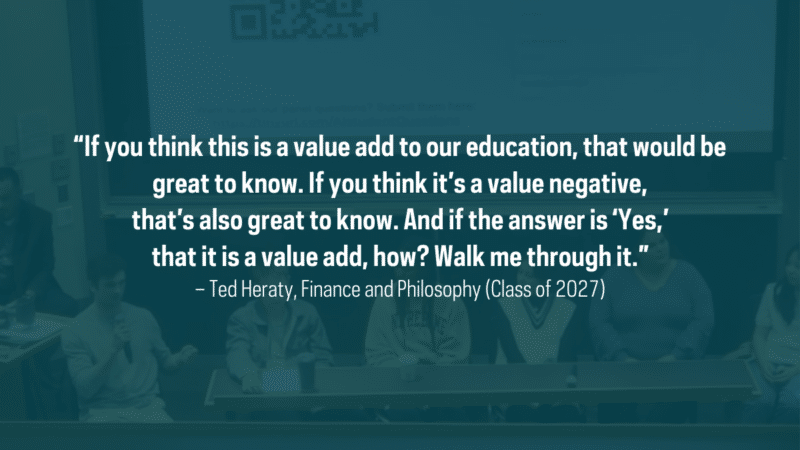In Case You Missed It: Teaching in the Age of AI: Student Perspectives

Notre Dame Learning wrapped up its 2023–24 Teaching in the Age of AI Series with a student panel on Friday, April 19.
More than 60 faculty, graduate students, and staff gathered to hear from Notre Dame undergraduates about the challenges and opportunities they see AI in education posing and to explore how we can move forward as a campus community in light of the rapidly expanding reach of artificial intelligence in our lives.
Titled “Teaching in the Age of AI: Student Perspectives,” the panel represented a range of academic disciplines:
- Grace Hatfield, Economics, Computing and Digital Technologies, and Gender Studies (Class of 2024)
- Giselle Henry, Architecture and Poverty Studies (Class of 2026)
- Ted Heraty, Finance and Philosophy (Class of 2027)
- Jolin Liu, Computer Science and Philosophy (Class of 2027)
- Sarah Ochocki, Neuroscience; Education, Schooling, & Society; and Computing and Digital Technologies (Class of 2024)
- Jacob Sherer, Political Science (Class of 2024)
Each panelist brought a unique perspective, discussing the effects of AI on writing, student and instructor relationships, their future careers, and education more generally. At the heart of the conversation were thoughtful considerations of how AI is shaping the future.
“You’d be naive to ignore AI and how it’s changing the world, how it’s changing the things we interact with on a daily basis,” Heraty said.
What this means for their education, panelists were still uncertain. Calling AI a “black box,” Sherer pointed out that AI technologies and their applications are still evolving, noting that discerning the effective from the useless can be difficult, so it isn’t surprising that instructors are skeptical.
But all the panelists were united in their desire for greater dialogue about AI and were excited about the possibility of learning together and navigating the challenges with their instructors.
“It’s encouraging to know that we’re sharing space with these great minds, and we’re both trying to figure it out together,” Ochoki said.
The students’ optimism about the potential benefits to their learning, however, was balanced with a dose of skepticism.
“The fear of it is that it turns into this situation where faculty are using it to provide feedback, and students are using AI to turn in things,” Sherer said. “And so then education is reduced to just two AIs talking to each other.”
Students were also attuned to the difficulties and concerns of academic integrity, AI detection, and their motivation to learn. In their experience, the use of tools like ChatGPT to cheat is a last resort for students—typically because of time constraints, not understanding a concept or an assignment, having to manage competing priorities, or a lack of confidence in their abilities.
Hatfield suggested ways to disincentivize cheating from the start, such as doing away with zero-tolerance late policies, while another panelist cautioned against just assuming students are cheating.
“We want our agency in what we’re arguing about,” Liu said. “In my two majors, it’s influencing how we are thinking and maybe improving efficiency. But there’s no panic because we want to keep our agency and our power.”
When asked if greater transparency and guidance from faculty would be useful, the students’ answer was a resounding “yes.” Clearer AI policies in syllabi, introducing AI in the classroom in a controlled way, and providing examples of how faculty themselves are using AI tools in their own work were key pieces of the call for more open dialogue from the panelists.
As Heraty put it, “I’m here. This is a big investment for all of us to come to Notre Dame, invest in ourselves, to educate ourselves. And so if you think this is a value add to our education, that would be great to know. If you think it’s a value negative, that’s also great to know. And if the answer is ‘Yes,’ that it is a value add, how? Walk me through it.”
These students’ insights offer a powerful starting point for supporting a teaching and learning environment where AI is implemented thoughtfully and productively to prepare students for their future careers and to be more digitally informed citizens.
“My hope is that the skepticism turns to [a drive to find] productive solutions,” Henry said. “Whether that means making assignments more reflective and less like, answer this question that only has one answer, I think this is an awesome opportunity to rethink education and reinvent teaching.”
The panel was moderated by Alex Ambrose, program director of assessment and analytics at Notre Dame Learning’s Kaneb Center for Teaching Excellence, and Amanda Leary, a postdoctoral fellow at the Kaneb Center. Ron Metoyer, vice president and associate provost for teaching and learning, also attended and offered opening remarks.
Resources:
- Panel Presentation Recording (NetID login required, 1 hr, 12 min.)
Related:
- See the Launch Post on the “Teaching in the Age of AI” series for information about all the past year’s events.
- Check out our resource on Teaching in the Age of AI.